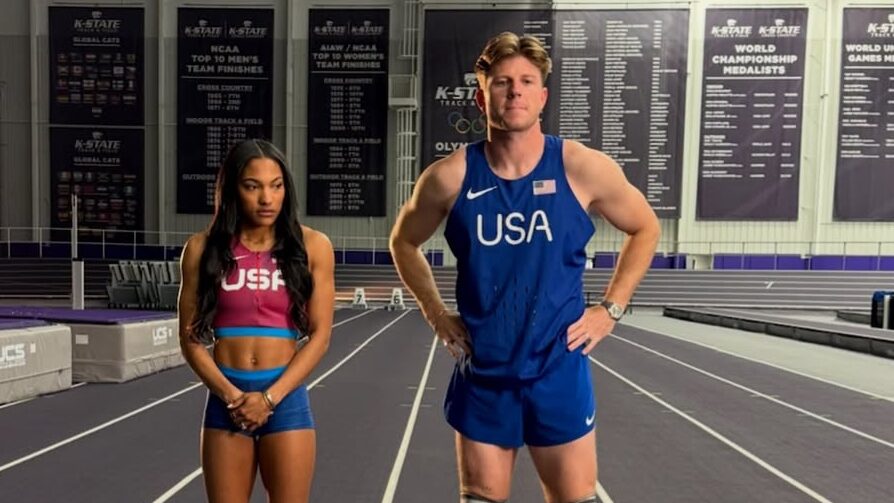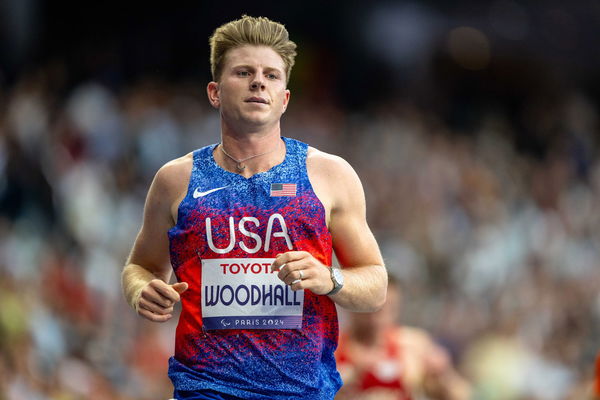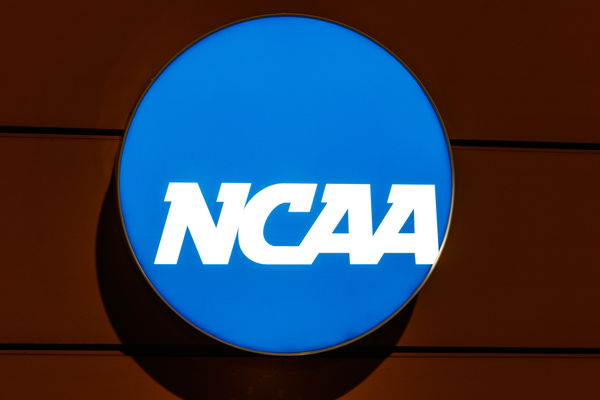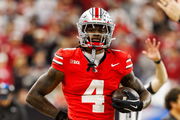
Imago
Hunter Woodhall and Tara Davis-Woodhall (Image Source: Instagram/@hunterwoodhall

Imago
Hunter Woodhall and Tara Davis-Woodhall (Image Source: Instagram/@hunterwoodhall
Neither Tara Davis-Woodhall nor Hunter Woodhall had it all easy during college. After transferring from the University of Georgia to the University of Texas, Tara faced challenges due to NCAA transfer rules, which delayed her competition eligibility for a season. Her husband, on the other hand, faced problems finding a college. And when he finally did, Hunter was forced to quit in 2021 because of NCAA rules. This was a very troubling incident in his life. And now, he has spoken up about the incident.
Watch What’s Trending Now!
“Yeah, I started Giant Hoodies in college and was part of the reason, like I lost my NCAA eligibility,” said Hunter Woodhall when Rodney Green asked him about his hoodie company. As much as the answer shocked the American coach, it was true. The Paralympian was forced to walk away from the NCAA because, as he explained, “you can’t have a business in college.” No money. This also forced him to turn pro, making his debut in the American Track League in early 2021. And then, he talked about someone else, too, who faced almost the same consequences!
Ryan Treyan, yes, the popular YouTuber.
ADVERTISEMENT
He discussed how he was a D1 runner at Texas A&M and how “he lost his eligibility for a water bottle company called Hydra or something like that. Same situation because you’re using your name, image, and likeness owning the company.” Treyan lost NCAA eligibility for promoting his water bottle company, Neptune Bottle. He later got a waiver but chose to leave school to focus on YouTube and business. Then, there were further explanations regarding Hunter’s violation in the podcast.
He disclosed that he did not use his socials to promote his company. But since he had his name attached to the brand, he fell under the same bracket of NCAA rule violations. But this did not surprise him.
Tara Davis-Woodhall’s husband confessed, “To be honest, like I had so much trouble just getting into the NCAA, I had so many fights just like proving that I belong there that I deserve to be there that I can compete at this level. Like it wasn’t surprising to me that they were finding ways to make sure that I wasn’t there anymore.”
ADVERTISEMENT
Given his status as a double amputee, he did not receive any college recruitment offers. Woodhall said he reached out to as many as 18 programs early on without any correspondence. And ultimately, offers did show up, and he chose the Razorbacks. But before he lost his eligibility, there was a way to save it, as well.

Imago
Paralympics Para Leichtathletik Paris, 02.09.2024 Hunter Woodhall of United States an den Paralympic Games Para Leichtathletik im Stade de France in Paris, am Montag, 2. September 2024. *** Paralympics Para Athletics Paris, 02 09 2024 Hunter Woodhall of United States at the Paralympic Games Para Athletics at the Stade de France in Paris, on Monday, September 2, 2024 Copyright: xBEAUTIFULxSPORTS/TobiasxLacknerx
“At that point, it was like for me to get my eligibility back, they wanted me to give them a large sum of money. They wanted me to remove everything on my social media that had anything to do with me running or connected to the University of Arkansas, and I had to walk away from my company,” the paralympian revealed in the podcast. And then, Justin Gatlin summed it up perfectly, saying that they wanted to extort him. The good thing was that things did not get as far as signing an NDA. Hunter chose to bet on himself, and the company did bear fruit later on.
ADVERTISEMENT
He explained that the business generated enough income to buy their (his and Tara Davis-Woodhall’s) first house and provide financial stability, covering their bills. This, in turn, allowed him to dedicate time to social media, which eventually led to securing his first champion contract. NCAA did not give an option B; he was standing on the cliff.
“I ain’t got no safety net. Like, if I don’t figure this out, if I don’t find a way to put food on my table and pay my bills, like that’s it,” he shared. Now that he looks back, that situation pushed him.
ADVERTISEMENT
He does believe that it was unfair, but “it turned me into the person that I am today.”
If we just talk about the track, Hunter went on to win a bronze medal at the Tokyo 2020 Paralympics and a gold medal at the Paris 2024 Paralympics in the 400m T62 event. The paralympian also taunted the NCAA with “Now they got to, I don’t know how many ever billions of dollars they got to pay back to the athletes.” As of the House v. NCAA Settlement, NCAA now has to pay millions of dollars to the athletes in the coming years.
ADVERTISEMENT
NCAA has to pay millions
Judge Claudia Wilken finally approved the House v. NCAA Settlement back in June, resolving multiple antitrust lawsuits alleging the NCAA unfairly restricted athletes’ earning potential. The settlement would “enable NCAA schools to share their athletic revenues with Division I college student-athletes for the first time in the history of the NCAA,” Wilken wrote in her 76-page opinion.

Imago
NCAA Headquarters. The National Collegiate Athletic Association regulates athletic programs of many colleges and universities I, Indianapolis – Circa: March 2019: NCAA Headquarters. The National Collegiate Athletic Association regulates athletic programs of many colleges and universities I
She added that it was “expected to open the door for Division I student-athletes to receive, in the aggregate, approximately $1.6 billion dollars in new compensation and benefits per year, with that amount increasing over the next ten years.” This means, under the settlement, NCAA and its Power Five conference members are required to pay approximately $2.8 billion in damages over the next 10 years to athletes who competed in college from 2016 to 2021.
ADVERTISEMENT
This backpay compensates athletes for the denial of opportunities to profit from their name, image, and likeness (NIL), which were previously restricted under NCAA rules. Also, starting in the 2025–26 academic year, each Division I school can allocate up to 22% of its media, ticket, and sponsorship revenue, approximately $20.5 million annually, to student-athletes. Funny enough, Tara Davis-Woodhall had a laugh at this decision.
Top Stories
Bill Cowher’s Strong Message to Steelers on Firing Mike Tomlin After HC’s Blunt Playoff Message

Andy Reid Fires Coach In Attempt to Rebuild Staff After Receiving HC Requests For Chiefs’ Coordinators

Who Are the Announcers, Referees, & Sideline Reporters for Ole Miss vs Miami? Everything You Need to Know for Fiesta Bowl

Jeremiah Smith Wants to Blame OSU Unit for CFP Loss & Has Urban Meyer’s Backing

Alex Pereira Confirms Major Tracy Cortez Relationship Status Update After Viral Marriage Proposal Clip

Sources: John Harbaugh Wasn’t Fired, Left Ravens After Refusing Major Staff Changes

But do you have any thoughts regarding this? Don’t hesitate to share with us…
ADVERTISEMENT
ADVERTISEMENT
ADVERTISEMENT

